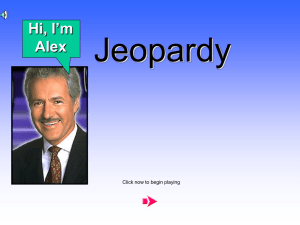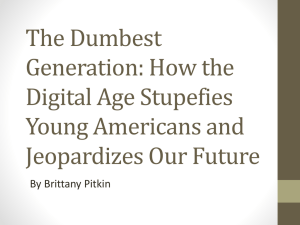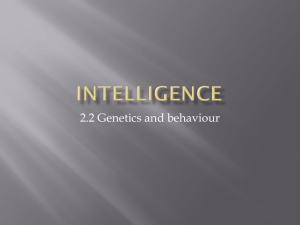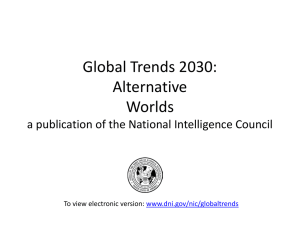Intelligence
advertisement
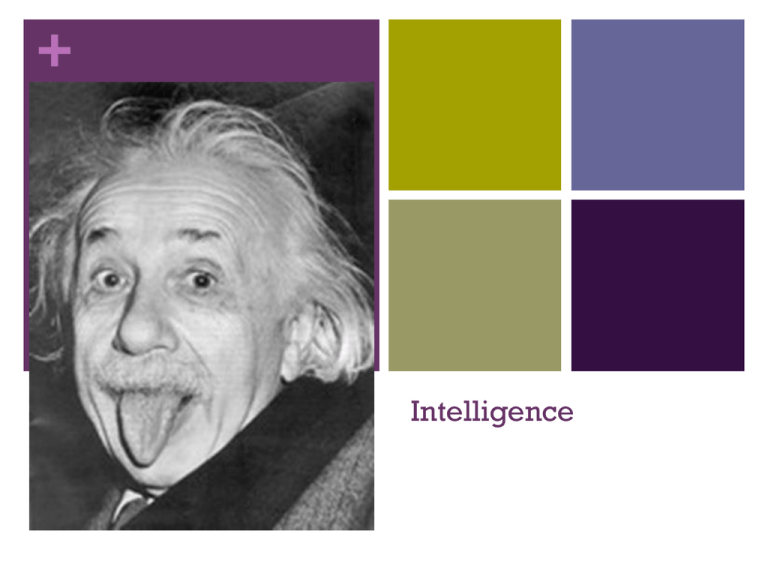
+ Intelligence + Essential Questions What is intelligence? What makes a person “smart”? What is the purpose of intelligence tests? How predictive are standardized tests (SATs)? + + What is Intelligence? Weschler Act purposefully Think rationally Deal effectively with the environment Spearman Intelligence is “general”; If you’re smart in one area, you’re smart in all areas Are there subcategories? (like “athleticism”, or “musical talent”) Thurstone is the first to break it down Spatial ability, perceptual speed, numerical ability, verbal meaning, memory, word fluency, and reasoning What’s missing? + What is Intelligence? Cattell Crystallized (verbal abilities, reasoning) vs. Fluid (observant, spatial awareness) Education can increase crystallized, not fluid Fluid can decline with age, crystallized increases Sternberg’s Triarchic Theory Analytical intelligence includes the ability to learn how to do things, solve problems, and acquire new knowledge (Alice) Creative intelligence includes the ability adjust to new tasks, use new concepts, and respond well in new situations (Barbara) Practical intelligence includes the ability to select contexts in which you can excel and solve practical problems (Celia) Which of these do you think is the most valued? Most important? + The Origin of “Intelligence Quotients” Early IQ tests were used to place children with learning deficiencies Simon-Binet Scale Measured “mental age” (based on logical, mathematical, spatial, reasoning skills Test was adapted by Terman (Stanford-Binet) Used to justify superiority of Anglo-Saxons Eugenics, Immigration caps Stern introduces IQ Mental age vs. Chronological age If you perform at level of an 8 year old and are 10, your IQ is 80 Verbal reasoning Abstract/visual reasoning Quantitative reasoning Short-term memory + Intelligence Tests The Wechsler Intelligence Scales The Wechsler Adult Intelligence Scale – Third Edition is the most commonly used test of intelligence for adults WAIS-III is divided into to parts, one that focuses on verbal abilities and one that focuses on performance skills Also a version for children, Wechsler Intelligence Scale for Children – Third Edition + What Makes a Good Test? Standardization uniform rules for administering, taking and scoring the test. Norms – performance benchmarks established during test development used to establish “average” performance. Representative Sample – group used to establish norms that adequately reflects the demographics of those who will be taking the test. + Scoring the IQ Test Raw Score - number of questions answered correctly; doesn’t tell much about performance Standard Score - score that tells you how you did compared to other test takers – a much better read of performance Percentile Score What does it mean to score in the 85th percentile? IQ what percentage of test takers you scored better than You scored better than 85% of the test takers = Mental Age/Chronological Age x 100 Most common IQ score? 100! Why? + What are we looking at? + Criticisms of IQ Tests Test content and scores Tests narrow set of skills? Measure of test taking ability? Test question bias unfair to minorities? Use of intelligence tests Could IQ result in permanent labeling and success Relationship does exist, but may be the result of a selffulfilling prophecy Case of Gladys Burr? + Critics of the “IQ”: Contemporary Theories of Intelligence Howard Gardner’s theory of multiple intelligences Logical-mathematical Bodily-kinesthetic Linguistic Interpersonal Spatial Intrapersonal Musical Naturalistic Can they be measured? How? Should we change our educational model based on his theory? (i.e. The Gardner School) According to Gardner, what type of intelligence are the following people displaying a high level of? • • • • • • • Lebron James Pat Sajak Ghandi Adam Levine Albert Einstein Sigmund Freud Ralph Waldo Emerson • Copernicus • F. Scott Fitzgerald • George Washington • Steven Wiltshire • Danica Patrick • Monet • Ricky Fowler + Contemporary Theories of Intelligence Daniel Goleman Proposed theory of Emotional Intelligence Emotional intelligence has five components Knowing one’s own emotions Managing one’s own emotions Using emotions to motivate oneself Recognizing the emotions of other people Managing relationships Comparing Contemporary Theories Gardner’s Multiple Intelligences Sternberg’s Triarchic Intelligences Logical-Mathematical Linguistic Analytical Spatial Musical Body-Kinesthetic Creative Interpersonal Practical Intrapersonal Goleman’s Emotional Intelligence Recognizing emotions in others and managing relationships Knowing, managing, and motivating yourself with emotions + What Determines Intelligence? Nature Biological similarities in Adoption Studies – IQ scores of child more closely correlated with biological mother than adoptive mother. Identical Twins reared apart – after identical twins reared together, identical twins reared apart have the highest correlation of IQ scores. + Correlation of IQ Scores of Family Members + What Determines Intelligence? Nurture Isolated or Deprived Environments Individuals living in culturally or physically impoverished environments have lower IQ scores Low SES areas; Eastern European Orphanages Causes? Hart and Risley’s study: After four years, children in welfare families would have heard 32 million words less than children from professional families. + What determines intelligence? Nurture (Cont.) Can IQ change in an improved environment? H.M. Skeels’ Orphanage Study Nurture (even if it is from intellectually impaired) increases IQ Capron and Duyme’s Adoption Study Followed children adopted by high vs. low SES Adopted children reared in high SES had highest scores BUT REMEMBER: IQ IS “RELATIVELY STABLE” AND DEPENDS ON NATURE AND NURTURE + Heredity vs. Environment: Which is More Important? There is general agreement that both heredity and environment affect IQ scores Debate centers around the relative contribution of nature (heredity) and nurture (environment) to the development of intelligence + Creativity Defined as the ability to produce novel and socially valued ideas** or objects Creativity has also been a shared trait in various murder cases Phil Spector: Songwriter, Producer and Creative Genius? Creativity and Intelligence – Correlation: creative individuals tend to have higher IQs AND creative individuals are perceived as being more intelligent as well. + The Tests: Open-ended questions Scoring based upon number of and originality of a person’s answers RAT (Remote Association Test) What words completes the triad? (park, gown, power) Torrance Complete the Picture Yamodo (like the Torrance?) Rate the creativity + Creative uses for: A A Brick piece of string and a cup of rice
